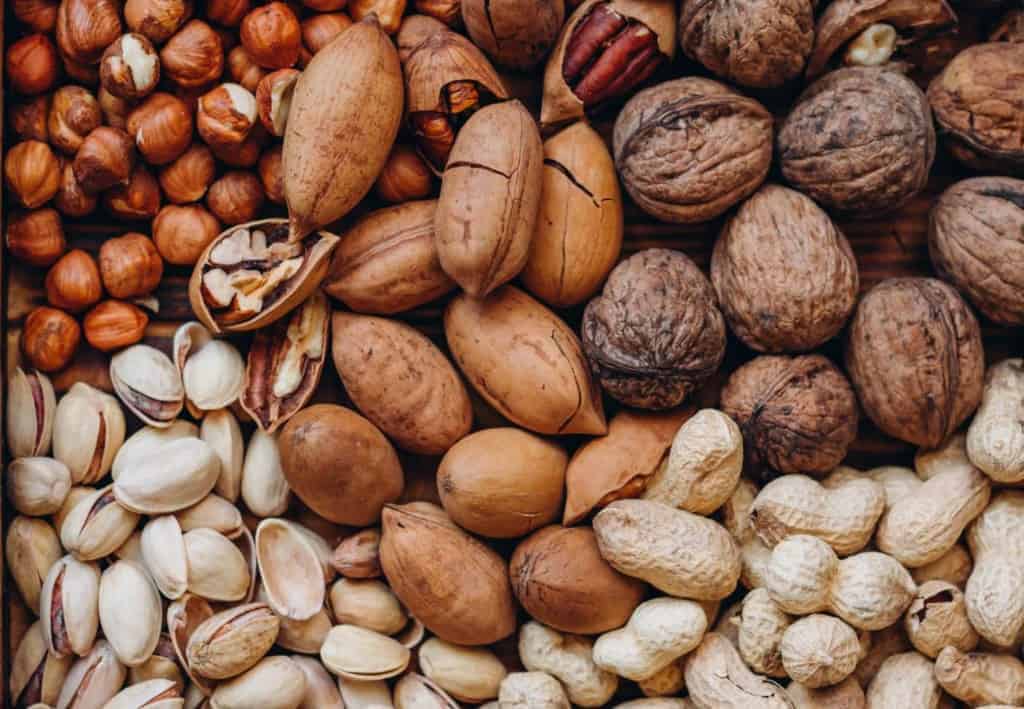Food of the Month – Nuts

Click here for two quick and easy dairy free dips!
Archeological evidence indicates nuts have been an important global food source throughout human history. Early humans cracked nuts with stone tools into stone vessels similar to a modern mortar and pestle.
Nuts can be categorized as ‘true nuts’ (hazelnuts), ‘culinary nuts’ (almonds, pistachios, cashews), and even ‘legumes’ (peanuts)!
Nutrition: While nuts are high in fat and calories, they are also high in protein, dietary fiber and important nutrients such as zinc and vitamin E. Nuts contain heart healthy unsaturated fats– MUFAs and PUFAs, which support a feeling of satiety or satisfaction after consumption.
One serving of nuts is one ounce and provides approximately 160 calories. Remember to eat “a handful, not a can full”!
One ounce of nuts equates to:
23 almonds, 18 cashews, 12 hazelnuts, 8 Brazil nuts, 12 macadamia nuts, 35 peanuts, 49 pistachios, 15 pecan halves, and 14 walnut halves.
Storage Tips: Like many foods containing unsaturated fats, shelled nuts can quickly oxidize and go rancid. Store nuts in an airtight container in the refrigerator for up to six months, or in the freezer for up to a year. Using clear glass jars is a beautiful way to “see” nuts in your fridge.
Fun Facts: Nearly all nuts grow on trees so are considered tree nuts. Peanuts are actually legumes, more closely related to peas, beans, and lentils, and grow underground.
California grows 80% of the world’s almond supply.
FYI: For a healthier nut option, skip the snack aisle and choose nuts from the baking aisle or grocery bulk bins. There are often more options for unsalted and raw vs. oiled and flavored nuts.
Cooking Tips: Cashews and peanuts add protein and a crunch to stir fries and salads. Nut butters can be blended into salad dressings, smoothies, or curries. Roasting or toasting nuts brings out more complex flavors, but be careful not to burn them!
Peanut allergy is the most common food allergy in children (2% of population) with only 20% outgrowing it into adulthood.
 Amber Phillips, MS, RD is a registered dietitian and the Director of Food and Nutrition Services at Island Health. She has a Master’s degree in nutrition from Bastyr University in Kenmore, WA and a Bachelor’s degree in biology from Metropolitan State University, St. Paul, MN. Phillips has a keen interest in community education. “Nutrition advice can be confusing and sometimes conflicting,” says Phillips. “My role as a dietitian is to follow the latest research and make it easy to understand for my patients and the public.”
Amber Phillips, MS, RD is a registered dietitian and the Director of Food and Nutrition Services at Island Health. She has a Master’s degree in nutrition from Bastyr University in Kenmore, WA and a Bachelor’s degree in biology from Metropolitan State University, St. Paul, MN. Phillips has a keen interest in community education. “Nutrition advice can be confusing and sometimes conflicting,” says Phillips. “My role as a dietitian is to follow the latest research and make it easy to understand for my patients and the public.”
Published on September 19, 2023
